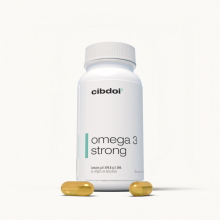Can Low Omega-3 Cause Brain Fog?
Published:
Brain fog refers to feelings of mental fatigue, cloudiness, and difficulty concentrating. It can severely impact cognition, productivity and quality of life.
Contents:
- What is Brain Fog?
- Omega-3s Roles in the Brain
- Potential Effects of Low Omega-3 Intake on the Brain
- Does Research Link Low Omega-3 to Brain Fog?
- How to Determine if Omega-3 Deficiency is Contributing to Brain Fog
- How Much Omega-3 is Needed to Prevent Brain Fog?
- Timeline for Benefits After Starting Omega-3s
- Are There Any Risks With High Dose Omega-3 for Brain Health?
- Lifestyle Approaches Also Important for Brain Fog Relief
- Should I Take Omega-3s for Brain Fog?
Omega-3 fatty acids play vital roles in brain function. This raises the question of whether low omega-3 intake can contribute to experiencing brain fog.
Below we’ll analyze the evidence on omega-3s and their effects on clarity, focus, memory, cognition and brain fog symptoms.

What is Brain Fog?
Brain fog is not a medical diagnosis, but rather a subjective feeling of:
- Reduced mental clarity
- Impaired ability to focus or concentrate
- Fatigue, haziness and slow thinking
- Forgetfulness and difficulty retrieving information
Additional symptoms may include lack of motivation, irritability, headache, anxiety and depression.
Brain fog can be chronic or come and go. It ranges from mild to severe enough to significantly disrupt work, school, relationships and daily tasks.
Potential causes include poor diet, lack of sleep, chronic stress, medications, mental health disorders, and certain medical conditions like hypothyroidism.
Could omega-3 deficiency also be a hidden contributor to brain fog? Let’s examine the evidence.
Omega-3s Roles in the Brain
The omega-3 DHA is highly concentrated in cell membranes throughout the brain and central nervous system.
DHA makes up over 90% of omega-3 fatty acids in the brain where it provides several essential functions:
- Forms neuron cell membranes and facilitates communication between brain cells
- Provides neurons with energy and aids with metabolizing neurotransmitters
- Enhances neuroplasticity and growth of new neurons in the hippocampus
- Reduces oxidative damage and inflammation in brain tissue
- Improves blood flow and vasodilation in the brain
- Optimizes synthesis of BDNF, a key growth factor for neurons
With omega-3 deficiency or insufficiency, these vital roles can become compromised, leading to suboptimal brain performance.
Potential Effects of Low Omega-3 Intake on the Brain
Low intake or deficiency in omega-3s may contribute to brain fog in the following ways:
Membrane dysfunction – Omega-3 loss from neuron cell walls impairs cellular communication, signaling, neurotransmitter metabolism and glucose transport in the brain.
Reduced blood flow – Low omega-3 decreases vasodilation, limiting oxygen and nutrient delivery to brain tissue.
Impaired neuroplasticity – Loss of omega-3s reduces neurogenesis, the growth of new neurons and synaptic connections in areas like the hippocampus.
Increased inflammation – Omega-3 deficiency allows inflammation to rise unchecked, damaging neurons and inhibiting function.
Oxidative stress – Lacking omega-3s removes their antioxidant protection, allowing reactive oxidative species to accumulate.
Low BDNF – Depletion of omega-3s drops levels of brain-derived neurotrophic factor needed for neuronal growth and survival.
Through these mechanisms, inadequate omega-3 consumption may contribute to noticing symptoms of brain fog like haziness, fatigue, and difficulties with memory, focus and clarity.
Does Research Link Low Omega-3 to Brain Fog?
Unfortunately, no studies have directly analyzed associations between omega-3 intake and subjective feelings of brain fog.
However, many studies demonstrate links between lower omega-3 levels and objective impairments in cognition, memory, processing speed, focus, learning and brain structure.
Here is an overview of key findings:
- Older adults with high omega-3 intakes experience less cognitive decline compared to those with low intakes.
- Low omega-3 levels correlate with smaller brain volume in areas like the hippocampus essential for memory formation.
- Countries with higher average fish consumption, like Japan, have lower dementia rates and better cognitive performance.
- Clinical trials show omega-3 supplementation improves focus, attention, processing speed, and mood in children with ADHD.
- Omega-3 supplements enhance aspects of memory, learning, and cognition in healthy young and middle-aged adults.
While more direct research is still needed, the cumulative evidence indicates inadequate omega-3 intake likely contributes to experiencing lack of clarity, focus and mental fatigue – the key symptoms of brain fog.
How to Determine if Omega-3 Deficiency is Contributing to Brain Fog
There is no defined blood omega-3 level that signifies clinical deficiency. However, experts suggest levels below 4-5% indicate insufficiency.
Signs that low omega-3 may be playing a role in brain fog include:
- Consuming little omega-3-rich fish or seafood
- Rarely eating ALA omega-3-rich nuts, seeds or their oils
- Having symptoms that improve after increasing omega-3 intake
- Low omega-3 index blood test result
Testing your omega-3 index is the most definitive way to identify if low levels may be contributing to brain fog. A result under 5-6% confirms deficiency that supplementation can help correct.
How Much Omega-3 is Needed to Prevent Brain Fog?
Recommended intakes vary based on age and health status:
- Adults: ~500-1,000 mg EPA/DHA daily
- Pregnancy & Lactation: ~300 mg DHA; 200 mg DHA daily
- Children: ~250-500 mg DHA
A supplement providing around 250 mg DHA and 250 mg EPA per day provides an optimal preventive dose for most healthy adults.
Those experiencing cognitive dysfunction, mood issues, or brain fog symptoms may need more like 1,000 mg EPA and 500 mg DHA daily. Always consult your doctor to find your optimal dosage.
Consuming omega-3 rich fatty fish 2-3 times per week also helps maintain adequate intake.
Timeline for Benefits After Starting Omega-3s
Relieving brain fog requires restoring omega-3 levels and allowing time for brain function to improve. Here’s a general timeline:
- 1-2 weeks: mood, focus, motivation may start to improve
- 1-2 months: more sustained energy, concentration, learning
- 3-6 months: enhanced memory, clarity, sharpness
- 6-12+ months: increased brain volume, neuron growth in hippocampus
Stick with omega-3 supplements for at least 3-6 months for noticeable cognition enhancement and brain fog relief. Combining with a healthy diet, exercise, stress reduction, and good sleep hygiene amplifies improvements.
Are There Any Risks With High Dose Omega-3 for Brain Health?
Higher doses of omega-3s for treating cognitive conditions are generally considered very safe. However, potential side effects may include:
- Fishy aftertaste
- Gastrointestinal upset like diarrhea
- Increased bruising/bleeding risk at extremely high doses
To minimize risks, choose quality supplements tested for impurities like heavy metals, start with low doses, take with food, and monitor for side effects.
Those on blood thinners should exercise caution with very high omega-3 intake over 3 grams daily and consult their doctor. Otherwise, omega-3 supplements have an excellent safety profile.
Lifestyle Approaches Also Important for Brain Fog Relief
In addition to omega-3 supplementation, a comprehensive approach should be taken to address potential dietary, lifestyle, and medical causes of brain fog, such as:
- Reducing inflammatory foods like sugar, excess saturated fat, alcohol and processed carbs
- Managing stress levels with meditation, yoga, therapy, etc.
- Treating underlying medical issues like thyroid disorders, autoimmune disease, sleep apnea
- Getting regular exercise and 7-9 hours of quality sleep nightly
- Staying mentally stimulated and socially engaged
- Avoiding nutritional deficiencies of vitamins B12, D, magnesium, etc.
- Minimizing unnecessary medications when possible
While increasing omega-3 intake provides an excellent foundation, a holistic approach yields the most dramatic relief of stubborn brain fog symptoms.
Should I Take Omega-3s for Brain Fog?
In summary, while no studies directly link low omega-3 status to subjective feelings of brain fog, substantial evidence shows omega-3 deficiency impairs cognition in similar ways.
Given their role in brain cell structure, energy metabolism, blood flow, and inflammation, adequate omega-3 intake is crucial for maintaining optimal mental clarity, focus, memory and brain function.
Testing your omega-3 index, increasing daily EPA/DHA intake to 500-1,000 mg, and allowing at least 3-6 months for benefits is a smart strategy if you struggle with brain fog symptoms.
When combined with overall healthy lifestyle and dietary measures, omega-3 supplementation may provide noticeable improvements in many aspects of cognitive performance.















